Description
The Political Traditions of Mohammed: The Hadith for the Unbelievers
According to Allah, the words and deeds of Mohammed form the perfect pattern for all Muslims to follow. Mohammed’s speech and actions are recorded in the Hadith, also called the Traditions. The Hadith are more important in the daily practice and worldview of a Muslim than the Koran. Without the Hadith, there can be no Islam.
In the Hadith, every subject, great or small, is covered–ethics, jihad, sex, slavery, art, and everyday habits are all described in great detail. The Hadith contains all of the tactical aspects of jihad. Jihad is neither a blind fury nor a hatred for non-Muslim but is a sacred act to prepare the world for Islam. Jihad is demanded of all Muslims and is the sixth pillar of Islam. The Hadith are a tactical manual of Islamic politics and are a key to understanding Islam.
POLITICAL TRADITIONS OF MOHAMMED takes the massive amount of foundational texts of the Hadith and condenses them by omitting the portions that do not pertain to the non-Muslim (the Kafir). Repetition is removed or summarized and the language is simplified to make it accessible and understandable.
Read The Political Traditions of Mohammed and learn about Islam from its source.
The Islamic Trilogy—Koran, Sira, Hadith
Islam is a political system, a culture, and a religion based upon the Koran, Sira (life of Mohammed), and Hadith (the Traditions).
The Islamic Trilogy series integrates the three primary texts to reveal the entire Islamic political doctrine of the treatment of non-Muslims.
The Trilogy is authoritative and fact-based. All content can be confirmed by the use of reference numbers in the primary source documents. All of the primary sources are used to give the complete picture of Islam’s political doctrine.
English
6″ X 9″ Paperback
196 Pages

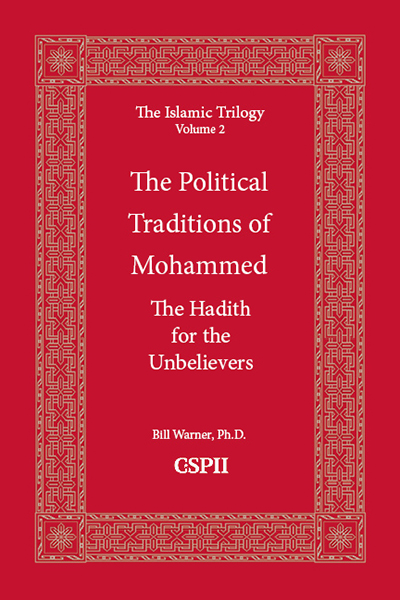
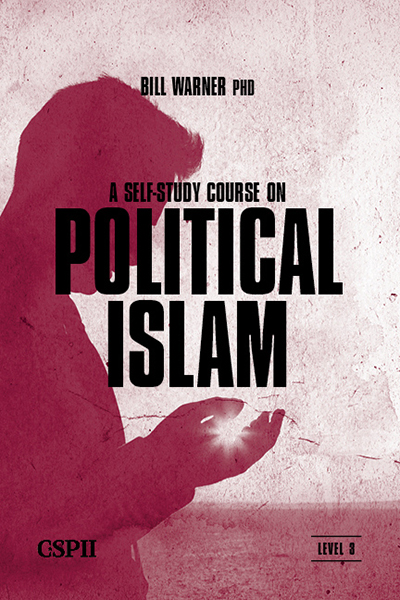
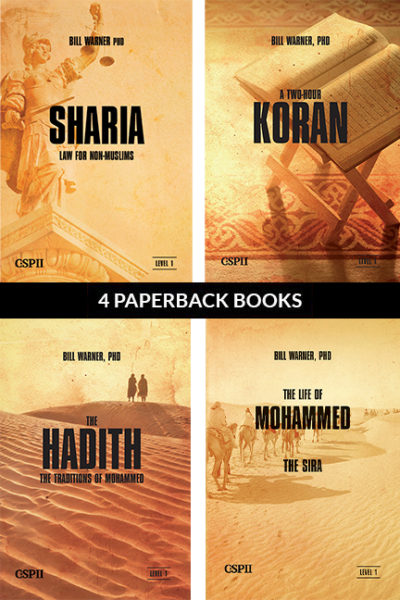
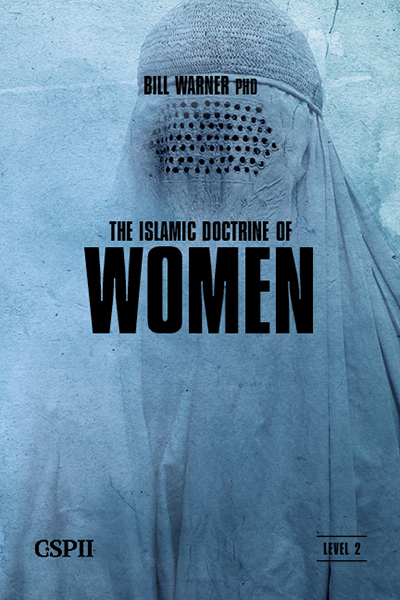
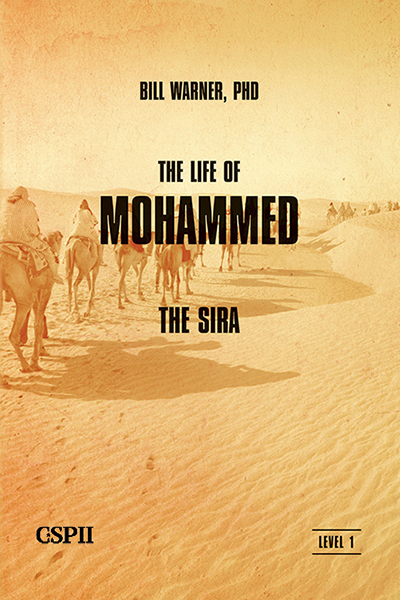

DhummitudeNorth (verified owner) –
Context: I am semi-retired and not an academic. However, 30 years ago I was a student of Sanskrit and a practicing member of several Hindu faiths, mostly those with an emphasis on meditation. Unlike most of my co-religionists, I always enjoyed reading religious literature, including obscure or multi-volume texts in order to understand theology, philosophical concepts and history. I am now a secularist with Buddhist leanings. Currently, I am reading Winston Churchill’s The River War (1899). I heard the quote about Islam being as dangerous as rabies in a dog, and I wanted to see for myself if this is accurate. By the way, this well-written war history is illuminating on the current situation in South Sudan (and on slavery), so I am l learning a lot more than I started to seek.
Dr. Warner’s books: In general, I find them to be very satisfactory introductions, though I am keen to establish a basis for other original sources in translation. I was not satisfied with the ‘Taste of’ series as I found them not ‘meaty’ enough. I like intellectual full-course meals. I also was disappointed, and thus far still am, in the repetitiveness of a minority of content in all of Dr. Warner’s books. I don’t mean that I am disappointed in repetitive tone and substance of Islam (I am and it is, but what can you do? Nothing) but rather the way Dr. Warner organizes and comments on the fundamental messages of Islam. I am not saying his conclusions are wrong, but the author includes in every title a stand-alone synopsis on the evils of Islam. I don’t like to see repeated (to me it is a waste of space) the very same assessments in every book, as if I have dementia and can’t remember what he wrote in his other books. I am hit by a double hammer – the inhumaneness of Islam and being reminded every book of the big picture. Thus, the books are part scholarly, part agenda driven. Be advised.
Bad Protestant that I was raised, I would rather come to my own conclusions based on the texts rather than have the author tell me what the text means. Good translation should do that alone, yes? So far, his study guide on the Koran weaves Sira and Hadith into it and the Hadith does the same with the Sira and Koran context. There are small sections of Dr. Warren’s conclusions and the section on slavery is mostly from non-Hadith sources. I am a purist. When I am reading the Hadith I want to read only the Hadith. However, I understand the need to contextualize the Koran. I am very keen to read general introductions and samplings of the other Hadiths, so have ordered a book from my local public library that does just that. I find that online sources of Hadith vary slightly with those in Political Life, but not so much that the message is vastly different. They do, however, tend to be more ambiguous.
I colour coded my reading notes, in descending order of priority. I came up with a total of 157 notations.
Priority I: 16
Priority II: 51
Priority III: 90
Plus two more for facts on the trilogy and Dr. Warren’s books, which I will not count here.
Before reading The Political Traditions of Mohammed I read Dr. Warren’s Abridged Koran, my first exposure to the texts of Islam. To compare my read of this Hadith sampler to the Abridged Koran, I made many less notes on fascinating points, similar to my reading of religious texts of other traditions. However, unlike reading Buddhist, Hindu or Sikh scripture, the priorities were still skewed towards the remarkable rather than merely interesting. Having made so many ‘BARBAROUS!’ margin notes in the Koran, I became somewhat enured to torture, chauvinism and sexism. So, even the urging to kill non-Muslims didn’t come as a shock. And when you get down to *how* to kill the unbelievers, or what to do with their bodies, although more graphic, it didn’t strike me as surprising. The Sira comes next, and I get to learn examples instead of stories. Ugh.
In general, the Hadith samplings just reinforced or flushed out with some detail what I read in the Koran, though in some cases it filled in empty spaces and even contradicted the Koran. Based on my reading of the Koran, a dozen different religious traditions could have emerged from the Koran. These Hadith of Sahih Muslim and Sahih Bukhari ‘nail down’ the theory into practice. And in detail. For people of most religious traditions more detail than is necessary to be devout. Now I understand better why Muslims do things the way they do – their habits, attitudes, tastes, likes and dislikes, even their favourite foods. In this sense the Hadith is more like Hindu and Buddhist literature. For example, we don’t know what Jesus of Nazareth ate at the last Supper. We do know some of the favourite dishes of Lord Krishna and what poisoned Gautama Siddhartha at his last meal (mushroom or pork, depending on translation and sect of interpretation). I mean, what relevance does Mohammed having one of his front teeth broken in battle, or whether he did everything from right to left have? To Muslims, who are instructed to emulate the ‘perfect man’, clearly something.
I am reminded of a scene in the film Osama, where a Muslim child is taught by the teacher to know how to bathe after a nocturnal emission (a bitter movie because the ‘boy’ is actually a girl). Right out of the Hadith. I am glad Dr. Warren skipped almost all the nitty-gritty of home life and most of Mohammed’s toilet and sleep habits. I want to know how Islam affects me as a non-Muslim ‘polytheist idol worshipper’ in a non-Muslim country and how this will change should Canada become Islamicized. I need to read Dr. Warren’s study guide to the Sira to know more about that as my understanding is that some of the conquered Arabian tribes were pagans. I am a ‘heathen’ so the sections on Jews and Christians are not so relevant to me personally. As a non-monotheist I am even more at risk than Yezedis and Zoroastrians. Which makes me wonder why members of more eastern religions are not more vocal. A whole other subject.
I enjoyed the five page introduction to the Hadith and the fact that there is a 19 page index (his Koran has a slightly briefer one). Being a bibliophile I also value the 15 title bibliography. This is often the first page I go to before I even start to read any non-fiction book and I was delighted to see further reading resources listed. I periodically go to the CPI website to see what books, not written by Dr. Warren are listed for sale. Thus far only two. The conclusions section is similar as to his Koran guide, and I left feeling it lacked much new to say specific to the Hadith. Thus, I think Dr. Warren’s Koran is superior to his Hadith. I suspect this is due in part to the primary place (in theory) that the Koran holds in Islam (so I suspect he spent more time on it) and the sheer volume of even one of the Hadith collections. To expect a full study of the two most respected Hadith collections is asking for a lot. If Dr. Warren writes and publishes a more analytical and broader range study of Hadith I will buy it.
The Political Traditions of Mohammed by Dr. Warner whetted my appetite to read Hadiths. Curiously, my local public library, in a community where the Muslim population (30%?) is mostly Persian, the Hadith are Shia versions. With the permission of the author I am considering sponsoring a second purchase to donate to the city so all can read this Sunni (?) sampler. I wonder if the librarians have any idea what the Hadith on the shelves say. How could they know? They are all in the Farsi language. Zero are in English. I am not in favour of censorship. I say that laws against ‘hate speech’ are counter-productive. Let the marketplace judge strange and nasty ideas. The library carries one copy of Mein Kampf (in Korean) and at least ten separate copies of Hadith. The same two-location library system has 14 books on Christianity and 26 books on Islam. I am not saying this is a bad thing. If you want to read more blood baths and how Islam is very political, I recommend two books some Canadian libraries also carry – Chasing the Mirage: The Tragic Illusion of an Islamic State by Tarek Fatah, Canadian Muslim and critic of his own religion; and After the Prophet: The Epic Story of the Shia-Sunni Split by Lesley Hazleton.
Things I learned (not in quotes if the meaning is included here without the text reference)…
ETHICS
“So, kill the apostates wherever you find them, because whoever do so will be rewarded on Judgment Day.”
B9, 64
“When Mohammed was told that Muslims had killed the children of their enemies during raids, Mohammed said that it was permissible because ‘they are from them’ “
M019, 4322
– There is no death penalty for a Muslim murdering a non-Muslim.
– (implied) Weapons are permissible in mosques
– A Muslim can swear an oath by another god and therefore not be held to it.
JIHAD
“Mohammed: “I have been ordered to wage war against mankind until they accept that there is no god but Allah and that they believe I am his prophet and accept all revelations spoken through me.”
M001, 0031
“A man said to Muhammed, ‘Tell me what act is rewarded as much as jihad.’ Mohammed replied, ‘I do not know of any.’ “
B4, 52, 44
“After the battle of Badr, the bodies of the Kafirs [non-Muslims] were thrown in a well where Mohammed addressed them, ‘Do you still believe the promises of your god?’ Somebody said, ‘You are talking to dead people.’ Mohammed answered, ‘They hear as well as you, but they can’t talk back.’ “
B2, 23, 452
“Mohammed punished the men of the Uraina tribe by cutting off their hands and letting them bleed to death.”
B8, 82, 795
– supporting a jihadi financially or supporting the family of a jihadi is equivalent to engaging in jihad
– Granting mercy to a non-Muslim in battle is a deadly sin.
BEHEADING
“When some of the remaining Jews of Medina agreed to obey a verdict from Saad, Mohammed sent for him. He approached the Mosque riding a donkey and Mohammed said, ‘Stand up for your leader.’ Mohammed then said, ‘Saad, give these people your verdict.’ Saad replied, ‘Their soldiers should be beheaded and their women and children should become slaves.’ Mohammed, pleased with the verdict, said ‘You have made a ruling that Allah or a king would approve of.’ “
B5, 58, 148
WOMEN
This could be a whole book in itself!
SUPERSTITIONS
In the largely Muslim country where I live part of the year there are a lot of shops selling supposedly Islamic things for no particular religious purpose – this spice, that dried fruit, perfumes in general, etc. There is a sentimental appeal for those objects and substances that goes beyond personal taste of the customer. It is because Mohammed liked or used them. Likewise, certain creatures are disliked, often strongly. In a country with a minority Muslim population even I would see non-poisonous reptiles left to die slow deaths from sticky paper and dogs poisoned. Now I know some of the whys.
– Mohammed ordered the death of almost all dogs after the angel Gabriel refused to visit him due to the presence of a dog in the house. A puppy had slept under his bed of Mohammed.
– After eating lick fingers before washing hands, don’t yawn or sneeze, don’t leave dishes uncovered or doors open, first meal in paradise is fish liver, black cumin is a cure-all, Indian incense treats throat ailments, don’t laugh at farts, roosters are good donkeys are bad.
MOHAMMED
There are 16+ pages on all kinds of details about the appearance and personality of Mohammed that are extremely boring due to their pettiness. For example, Mohammed slept with his feet straight out instead of crossed. I have read two of the study guides and I know a lot about Mohammed and almost nothing about Allah. And I suspect it’s going to get much worse with the Sira.
KORAN
– Gabriel revealed the Koran in the Quraysh dialect of Arabic, then it was recited in seven other (Arabic?) dialects. [Did Mohammed understand them all?]
Conclusion: Buy Dr. Warren’s books if you want the short story, the essence of Islam boiled down with some representative examples. There are not a lot of tangents in his work. I like distractions. I find them entertaining. But for logic and organization I very much value the CPI books. The problem with the Koran is it is a very weird book to understand written as it is from shortest to longest verses. Dr. Warner solves this by presenting his version in chronological order. The problem with even one Hadith is it is a mammoth length, like reading War and Peace X 10 or a junior version of the Pali Theravada Buddhist canon. Dr. Warner solves this by providing a generous number of representative examples from the two most respected (to Muslims) Hadiths. Both books are springboards to further study for the curious and satisfactory enough detail for someone who doesn’t like to hole up in his office reading for three or four days as I do.
Another thing I like about Dr. Warren’s books and presentations is, unlike some others who also have insightful things to say, he is not trying to be a ‘personality’. The message (of the messenger) is the important thing. CPI is about scholarship not ego.
Victor Sakala –
Five Stars
By Victor Sakala on November 4, 2014
Fascinating and easy to read. It should be required reading for all kafirs (unbelievers)
mdippy –
Very Informative
By Mark “mdippy” on February 9, 2014
Every page is an eye opener and you will have hard time putting it down. I found my self saying “Really?” and
Really!” a lot when reading this book. A very good book for anyone who wants to know the political laws and structures that Muhammad put forth. Condensed and easy to understand and read. Very comprehensive. It will change your view on Islam and enlighten you concerning how Jihad served as the means by which Islam spread throughout the east. Definitely a must have for anyone studying the truth about Islam.
Byron Fitzgerald –
Enlightening Book
By Byron Fitzgerald on September 21, 2012
This book gets to the basics on Islamic beliefs and describes these beliefs in clear, easy to understand language. I use it as a reference for this very complex area of study.
G. Wenner –
This book will enlighten every reader from the vail of ignorance
By G. Wenner on November 17, 2009
Answers to the many questions concerning radical Islam. You wont hear this on the 6:00 o’clock news, but we should be. This book is a must read for all humanbeings.
Colonel R. H. S. –
Political Islam
By R. H. Sweat “Colonel R. H. S.” on May 7, 2009
I bought this book for my own education on Islam. I found it very informative and interesting. It helps in understanding current world events.
F. Rosenzweig Lives –
Mohammedanism Made Simple for the Unbelievers
By F. Rosenzweig Lives on May 28, 2007
This 179-page paperback, Volume 2 in the ten-book series, fills a gigantic void for any layperson who wants to study the Hadith, also known as the Sunna, in easily readable “newspaper”/middlebrow English, logically, contextually and topically organized. Previously, one could not find such a compilation of verbatim excerpts in one place meant specifically for non-specialists interested in learning about Islam.
Most Westerners have no concept of how towering a figure Mohammed is to Muslims. He is in actuality a God-like figure in every way to the vast majority of Muslims — laity and clergy, Sunni and Shia, highly educated and illiterate — no matter what Muslim and Western apologists try to tell us. He is the “Seal of the Prophets” and “Allah’s Apostle.” Along with the Koran, the semi-sacred Hadith sets forth the theology of Islam and the most holy sacrament of Islam, Jihad (holy warfare against the unbelievers), as complemented by the Sira (canonical biographies of Mohammed). The religion of Islam is built like a three-legged stool: it can only be understood by reading all three parts of what the publisher (Center for the Study of Political Islam, CSPI) terms the “Islamic Trilogy” — The Koran, Hadith and Sira.
Muslims like to say that they don’t worship Mohammed, so they shouldn’t be called Mohammedans. But Lutherans don’t worship Martin Luther and Confucians don’t worship Confucius. This is but one of endless skirmishes in the civilizational war (this skirmish lost by the PC academics of the West) that has befallen the planet between the “unitary” ethical system underlying the Judeo-Christian values of the West (not to mention the cognate ones of the Dharmic religions) and the “dualistic” situational ethics — one set of ethics for believers, another for infidels — of Islam (which means “to submit”) and Muslims (“those who have submitted”), who live by Mohammed’s example and exposition of how to treat the unbelievers as contained in the Hadith.
This work is a true page-turner, riveting as a “holy book” can be. Some of the chapter titles: Ethics – Jihad – The Dhimmis – The Beheading – Slaves – Women – Sex – Apostates – Sharia Law. The book includes a 6-page overview at the beginning, a most enlightening 7-page epilogue, and a one-page bibliography.
CSPI used anonymous scholars to translate the Hadith and write the overview and epilogue chapters. That is a sad commentary on the fact of life that any Higher Criticism analysis of the Islamic holy texts is strictly forbidden by almost all Islamic scholars of Islam. Death fatwas (edicts by Islamic authorities) cast a pall over any serious students of Islam who attempt to apply two-hundred-year-old Western scholastic disciplines to bear upon the holy books of Islam. That is why CSPI has done such a great service to non-believers worldwide in giving hitherto impossible entre into the heart and soul of Islamic theology.
This great work of “scholarship for the masses” is a landmark in bringing the tenets of Islam to any Westerner who can read a daily newspaper.
Kudos to CSPI for this brilliant little book!
Frank –
A great book!!!
By Frank “Frank” on December 7, 2006
This is and outstanding work that fully explains the Islamic mission in political terms. After reading this book, you will completely understand the Islamic doctrine and the threat to non-Muslims and other religious cultures. This is one of several books written by the Center for the Study of Political Islam and I would recommend each of these texts. They represent the most comprehensive study of Islamic scripture to date. Frank, Vanderbilt University